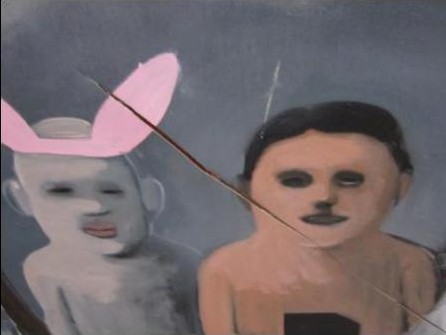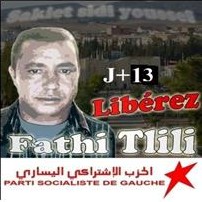13 Jun 2012 | Middle East and North Africa, Tunisia
On 12 June, the Tunisian Ministry of Culture decided to temporarily close Palais El-Abdelia, where the controversial Pritemps des Arts fair’s closing ceremony took place last Sunday. On the night of 10 June, ultra-conservative Islamists attacked the gallery, claiming that it exhibited artworks offensive to Islam.
During a press conference, the Tunisian culture minister, Mehdi Mabrouk, said that some of the artworks exhibited at Printemps des Arts did transgress Islamic holy symbols — something the fair’s artists deny. He also said that some of these artworks are now under investigation.
“In art, there is provocation. Art sometimes provokes, and this is its role. But there is a red line which separates provocation and the assault on sacred symbols”, said the minister.
After acknowledging the provocative role of art, Mabrouk told Radio Shems FM on the morning of 14 June that six works deemed to be “provocative” had been confiscated.

“There were not art works assaulting sacred symbols, unless Salafis are considered sacred,” said Amor Ghedasmi, the secretary general for Syndicate for Plastic Artists, also speaking on Radio Shems FM. The fair did contain several works criticising Salafis, who advocate for a hardline interpretation of Islam.
He denied that the exhibition featured a work of art depicting the prophet Mohammed. Pictorial representations of prophets and god are considered forbidden in Sunni Islam.
Ghedasmi also offered his own interpretation of a controversial work of art, in which the phrase “Glorious is Allah” is spelled out in ants. “The work illustrates a boy bearing a back bag. It symbolises the heavy burden of education and discipline. Ants are also known to be hard-working, and disciplined too”, he said.
“I ask the ministries of culture and religious affairs to show us the artworks [which they described as offensive to Islam] and also give us their interpretations,” he added.
The Tunisian Ministry of Culture is planning to lodge a complaint against the fair’s organisers for “assaulting the feelings of the fair’s visitors”. Palais El-Abdelia will stay closed until a committee to oversee it is formed.
13 Jun 2012 | Middle East and North Africa, Tunisia

Journalist and activist Ramzi Bettaieb ended a 15-day hunger strike yesterday.
Three other activists and bloggers, Azyz Amami, Houcem Hajlaoui and Emine M’tiraoui, who went on hunger strike in solidarity with Bettaieb have also ended their action.
Bettaieb, who works for the blogger’s collective Nawaat, went on hunger strike to highlight the lack of transparency in a crucial case being tried in front of a military court. On 21 May, the military authorities confiscated two of Bettaieb’s cameras as he tried to cover trials at the Military Tribunal of El Kef in the investigation of the murder of protesters during the 2011 Tunisian revolution
Tunisian journalists’ video coverage of court hearings is currently restricted to three minutes inside court rooms and Bettaieb accuses the military of deliberately preventing journalists from documenting what Nawaat has described as “the most important trials of Tunisia’s modern history”.
Bettaieb has now his cameras back, and the support of Tunisia’s constituent assembly, which pledged to look into his demands of lifting the restrictions on journalists and activists seeking to cover the court hearings in the martyrs’ case.
Bettaieb has also demanded the case be tried instead by an independent judicial structure instead of miltary judges.
“Our bodies’ powers are limited, but our determination is unlimited,” Bettaieb said at a press conference.
12 Jun 2012 | Middle East and North Africa, Tunisia
The Tunis Printemps des Arts (Spring of Arts), a modern contemporary art fair, ended on 10 June after 10 days of exhibitions and competition. The closing ceremony, which was supposed to be a celebration of art, was characterised by controversy, censorship and violence.
On Sunday afternoon, three ultra-conservative Islamists (reportedly two men and a woman) accompanied by a bailiff and a lawyer toured Palais El-Abdellia, the art gallery which hosted the fair’s closing ceremony. The group asked the fair organisers to take down two artworks they deemed “un-Islamic”.
One of the artworks in question illustrates a naked woman, whose intimate parts are covered by a Couscous plate (a popular Tunisian dish). The woman is surrounded by dark, bearded men. The second work illustrates a bearded superman carrying another bearded man in his arms.
“They said that they would come back at 6 pm, and that they would rather not find the paintings,” said Aicha Gorgi, a gallery owner and artist. “They did come back at 6pm, their number grew, and they gathered in front of Palais El-Abdelia,” she added.
Police interfered to prevent any clashes between the artists and the ultra-conservative group. But later on in the night and after the closure of the art gallery, the ultra-conservatives came back in larger numbers and succeeded in invading El-Abdelia art gallery. They burned and destroyed a number of artworks.

“Police did not allow them to enter, but they climbed over the rear walls and entered the gallery,” Gorgi said in a testimony given to Radio Mosaïque FM. “They burned the work of Faten Gaddass, and tore to pieces two linen artworks, one by Mohamed Ben Slama, and the second by a French artist. At my stand, I also found Aicha Filali’s work destroyed.”
This is not the only censorship story which characterised this year’s Printemps Des Arts edition. Last week, young Tunisian artist Elektro Jaye claimed that the state put pressure on the fair’s organisers to take down his work.
7 Jun 2012 | Middle East and North Africa, Tunisia

13 days after police arrested him, Fathi Tlili, a coordinator for the Leftist Socialist Party (Le Parti socialiste de gauche in French), is still behind bars.
The arrest followed Tlili’s participation in protests which swept Sakiet Sidi Youssef, a small and underprivileged town in the northwest of Tunisia. On 25 May, the town’s inhabitants organised a general strike demanding employment and a local development boost.
The strike, which paralysed the town’s little economic activity, ended in acts of vandalism when unemployed protesters set official buildings and state-owned cars on fire.
Police are accusing Tlili of “inciting riot”, and of “breaking down” the local delegation’s rear door building. The PSG has denied these charges, claiming that Tlili and other party activists tried to stand up to acts of vandalism.
In a communiqué released on 3 June, PSG Secretary General Mohamed Kilani described the legal proceedings against Tlili as “a political trial”. He claims Tlili was badly treated while in prison.
“After visiting him in prison, Fathi’s wife asserted that her husband was physically abused, and badly treated. She noticed the bruises on his body,” the communiqué stated.
The Tunisian extreme left is often blamed for fuelling protests and social unrest. I an interview given to Al-Jazeera last January, Tunisian President Moncef Marzouki accused the “extreme left” of “manipulating, and politicising social protests in order to stir up trouble”.




